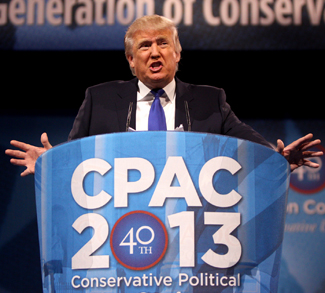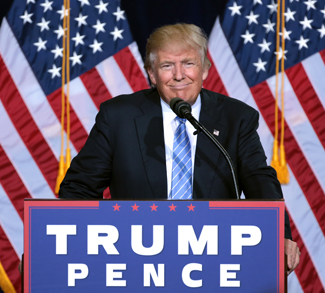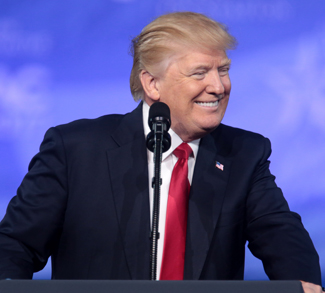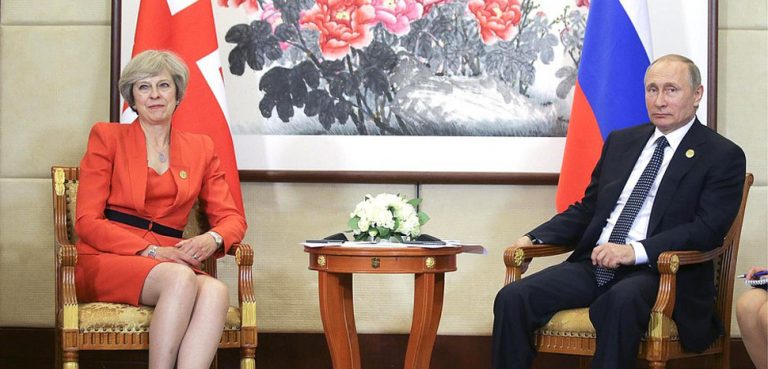Donald Trump’s foreign policy views have generated a lot of controversy ever since he became a credible contender in the US presidential race. As president-elect, his remarks and, more important, his initial decisions, continue rattling the nerves of the US mainstream political apparatus across party lines, particularly as his judgement relates to the tumultuous US relationship with Russia.
To the establishment’s dismay, Trump has nominated ExxonMobil’s CEO, an oil businessman with extensive dealings in Russia, as secretary of state in the coming administration. The uproar that this appointment caused shed some light on the views (and limitations) of US officialdom on foreign policy and Russia in particular. Rex Tillerson is aggressively questioned for being ‘a Russian friend,’ a corporate business dealmaker with potential conflicts of interest, for not having international political experience and/or because his nomination implies a foreign policy devoid of ‘moral clarity.’ These arguments deserve some reflection.
Historically, US foreign policy has had a propensity for presenting itself as driven by values and principles. The roots of this belief are quite complex and include a sense of ‘exceptionalism,’ a belief deeply rooted in the American psyche and its messianic role and which has strong religious (Protestant) roots. Borrowing a term from the financial investment world, I would describe it as a ‘value-oriented’ foreign policy. Although this is not the norm in international relations (Russia and China, conspicuously, do not do this), this moral posturing has old precedents. Consider, for instance, the stance of Athens during the Peloponnesian War as defender and promoter of democracy in the Hellenic states and Pericles’ famous funeral speech presenting Athens as the example to follow (which reminds of John Kennedy’s talk at the height of the Cold War). As far as we know, it all ended up in tears for Athens.
During the Cold War, the impact and even the existence of the U.S. military-industrial complex were successfully dismissed as mere communist propaganda. But the facts are overwhelming.
The value-oriented attribute of American foreign policy has evolved since the country’s independence and its early incursions in the global arena. As a young nation, the U.S. understandably feared becoming again a European colony, prompting it to develop a formal policy of excluding European powers from the entire continent. ‘America for Americans,’ James Monroe’s slogan, was until very recently presented as a generous and disinterested call for independence of the entire Western hemisphere from old colonialism, but in reality it meant much more. Following the independence of most of Hispanic America and the growing economic and military strength of the United States, an opportunity for US hegemony opened up in the New World. Latin America was the first field (and victim) of American supremacy during the 19th century. However, US foreign policy didn’t always pretend to follow a moral compass. It is still debatable if Franklin Roosevelt actually said that a tin pot dictator from Nicaragua (or the Dominican Republic) ‘may be a son of a bitch but he’s our son of a bitch,’ but the statement candidly reflected what American foreign policy was (and mostly is, considering some of its allies) all about. From early days, this moral high ground was perceived by a few discerning ones with skepticism; the U.S. tried to justify its participation in World Word I as defender of democracy (the real reasons being more down to earth, including Germany’s threat to US merchant ships), an argument presented by Woodrow Wilson which some was criticized as having feeble feet since US allies included Imperial Britain and Tsarist Russia.
At the dawn of World War II, the US moral portrayal in foreign policy took a more definite shape. The fight against Nazi Germany and Imperial Japan was convincingly presented as a struggle for freedom and (once again) democracy, although this banner never ceased to cause discomfort given the US alliance with the Soviet Union, arguably the epitome of tyranny for most Americans. With the Nazi defeat and America’s refocus on the Soviet Union and its allies as main adversaries, the focus on values could take a clearer role with a lower risk of being named hypocritical. The international Marxist call, led by the U.S.S.R. and the People’s Republic of China, for so-called worldwide liberation against US capitalist hegemony, having also a very strong moral and ideological background, facilitated the U.S. to present its moral banderol once more. It also made it easier to justify (or simply ignore any criticism of) the C.I.A.’s prolific sequel of regime change actions and other mischief across the world.
Although the alleged correctness of US foreign policy still has plenty of supporters, for reasons ranging from pure political convenience to sincere ideological beliefs, the real consequences of American foreign policy for a least a century cannot be ignored. The United States’ undoubted contribution to the defeat of fascism in World War II, on one side of the balance, is outweighed by decades of death and destruction in Africa, Asia, and Latin America in the name of freedom. US foreign policymakers forgot more than once that acting in the name of morality and righteousness led to the worst excesses of the European religious wars and the French Revolution. This is the fundamental flaw of believing in a value-oriented foreign policy. In international relations, one-sided morality will always clash with raison d’état and will inevitably be sacrificed. It would be more ethically convincing to believe that the primary duty of any government is to protect its citizens. ‘We must take care of our own people first,’ Trump’s battle cry during his presidential campaign, struck more than one chord. This, of course, has dangerous implications as governments collide, as they have done during the entire history, in the protection (right or wrong, real or alleged) of their people. But this is the world we live in, hopefully improved by the growth of a true international order where guiding principles will reflect the beliefs of the entire civilized world.
In the current global geopolitical stage, US foreign policy could not have found a more convincing adversary than Russia. The sins of Crimea, Georgia, and the Syrian civil war (plus the more recent hacking accusations ironically pointed out by the C.I.A., the world’s master of surveillance which recently finished quite successfully a wiretapping exercise on America’s top allies, including Frau Merkel) are enough reasons for many to put Russia in the dock and even to discuss potential military retaliation. But way before these events, the American elite had assimilated with gusto ancient European fears of Russia that over centuries came from different directions, from Karl Marx’s repeated calls for a Prussian invasion to topple the Tsar (to get rid of what he believed was the most despotic European government and pave the way to European social revolution) to Adolf Hitler’s vow in his last military proclaim that ‘Europe will never become Russian’ (he genuinely believed that Russia was an Asian nation). No matter how appealing may still be Russian culture in certain segments of Western intellect, this vast country is still an enigma. Of course in Washington D.C. everybody in power is aware and happy of the demise of the Soviet Union 25 years ago, but very few seem to realize that Russia is a country vastly different from the Soviet Union (a confusion well noted by Alexander Solzhenitsyn). On Crimea and the Ukraine crisis, few American politicians have tried to understand Russia’s position and what the Kievan Rus is all about, and have simply resorted to a Manichean judgmental approach.
The particular antipathy that vast segments of the American establishment have toward Russia has complex roots. The U.S.S.R. symbolized to America everything that was against the raison d’être of the U.S., i.e. its liberal democracy and its capitalist system. Few have noticed that Marxism does not present a challenge any longer (or has receded until better times), much less from Russia.
It is tempting for American politicians to simplify the world’s dynamics given the country’s straightforward geography and relatively simple neighborhood, compared with Russia’s 14 borders, having being invaded by every single meaningful European and Asiatic power (plus the U.S. during the Russian Civil War) at one point or another. Americans have difficulty understanding the depth of the pain of World Word II in the Russian soul (which makes ordinary Russians truly wary of military confrontation): as much as every life matters, 418,500 American deaths cannot weigh heavier than 24 million former Soviet citizens.
In American leading circles, nobody gives credit (to the contrary, it would be considered laughable) to the role of Russia in the remarkable peaceful demise of the Soviet Union, a very first in the history of humankind. If an objective measure would be used to rank states according to Western perceived shortcomings, Russia would not fare worse than most countries but nevertheless the perception would still place it at the very bottom.
I suspect, however, that there are growing limits to Russo-phobia despite one of the most systematic anti-Russian campaigns that the Western media ever led. Trump’s remarkable victory is a proof of this.
While the Western mainstream media keeps (and will continue) its focus on Russia’s wrongdoings, American investments and dealings in Russia are growing, from real estate to natural resources. The apparent contradiction between an American policy aimed at causing Russia economic injury (through sanctions) and an increasing bilateral business environment is clarified when we remember that the ultimate beneficiary of American assertiveness towards Russia is the U.S. military-industrial complex, presciently (and ironically) denounced by NATO’s first Supreme Commander and later on U.S. President Dwight Eisenhower.
During the Cold War, the impact and even the existence of the U.S. military-industrial complex were successfully dismissed as mere communist propaganda. But the facts are overwhelming. The U.S. defense budget is more than 1/3 of the world’s total and larger than the combined budget of the next 7 countries. 59% of arms sales from the world’s top 100 companies are made by American companies. US arms exports conservatively represent 1/3 of the total world sales. US defense spending represents 9.2% of the country’s general government expenditure. It would be simplistic to reduce US foreign policy to the role of a globetrotter weapons salesman, but it is equally naive to ignore that the US defense industry has had a lasting impact on American decision making.
Can US foreign policy rely on alternative economic and social forces less lethal that the military-industrial complex? If this is possible, then we have a ray of hope in a world that day by day becomes more dangerous. While consumption prompts business sales, war (i.e. weapons consumption) does not need to be a main driver of jobs and government taxes. A foreign policy that considers broader and more stable interests in bilateral and multilateral relations could develop better measures of self-restraint.
Donald Trump as US President presents the possibility of doing politics with non-conventional (i.e. less ideologically charged) eyes. As a down to earth (real estate) businessman, Trump had to walk through life literally with his five senses open. During his campaign he deplored the state of US infrastructure in comparison to the impressive constructions that oil has funded in places like Dubai. This could not have escaped him, but likely it evades most US politicians that land in foreign countries with lavish receptions and undue attention that deludes and prevents them from noticing the real world. Until now, Trump’s world has been more real that Hillary Clinton’s universe of like politicians, lobbyists, campaign financiers, and sycophants.
At some point in their professional lives, full time politicians inevitably lose perspective. This makes them gravitate around the key eternal bureaucracies (the ‘curia’ in the governmental makeup, defense/intelligence establishments) and fall in the trap of the immovable agendas of these entities. For ambitious but inept politicians (and opportunists playing politics), perennial playbooks offer the opportunity to avoid accountability and decision-making; this is for instance the reality of many Central and Eastern European governments following the diktats of NATO and the European Union establishment, but that is another matter.
In his efforts to reshape US international relations, Donald Trump could build strong and natural allies in a world that has deeply changed, and where multilateralism plays a growing role (to the consternation of those that thought that the demise of the Soviet Union would consolidate the United States’ world predominance). Hopefully, he will understand that the U.S. has growing limitations in its ability to exercise military power for a variety of reasons, including a dramatic change in the dimension and nature of military conflicts and its waning economic power. Historically, military power outlasts economic power (the Soviet Union was a good example). It would be a supreme irony if the U.S. would follow a path similar to the Soviet fate.
The opinions, beliefs, and viewpoints expressed by the authors are theirs alone and don’t reflect any official position of Geopoliticalmonitor.com.




